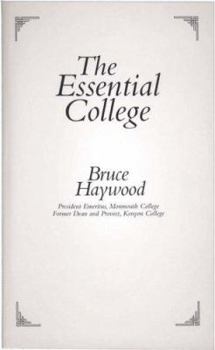The Essential College
No Synopsis Available.
Format:Paperback
Language:English
ISBN:1880977168
ISBN13:9781880977163
Release Date:March 2006
Publisher:XOXOX Press
Length:268 Pages
Weight:0.70 lbs.
Dimensions:7.8" x 0.8" x 5.0"
Customer Reviews
2 ratings
Encouragement on the Essential College
Published by Thriftbooks.com User , 16 years ago
I have been encouraged by reading Bruce Haywood's book `The Essential College'. In it he quotes a Gordon Keith Chalmers, who had been president of Kenyon College from 1937 to 1956, who argues that dealing with fundamental questions in college is not only to be able to think independently, but to understand that the purpose of education is moral action. Although Haywood does not use the term `Moral Philosophy', and may have some presuppositions (and therefore conclusions) with which church-related schools (about whom Haywood has written elsewhere) may disagree, the stories in the early chapters of the book were very encouraging regarding the importance of the moral element, the view of wisdom as including a call to right action, and the collegiality possible in a small college. I recommend Haywood's book, which at least calls us to "work to return... college to what it was: an institution devoted to the essential studies and to the moral purposes of liberal education." Church-related colleges may wish to re-interpret his vision of Goethe's program for re-vivifying the liberal arts, instead turning to biblical principles on value, meaning, and subsequent conclusions. They may orient themselves toward the Self-Abiding One - Father, Messias and Holy Spirit; and where the Spirit of the Lord is there is liberty; not merely to a humanistic view of freedom. With potential re-interpretation, however, all are free to enjoy his recounting of his vocation from young scholar yearning for collegiality and a view of the unity of knowledge to becoming dean and provost attempting to continue to implement the liberal arts into the Essential College.
A treasure
Published by Thriftbooks.com User , 19 years ago
Few writers on higher education have mastered their subject so completely as Bruce Haywood has the subject of liberal education. Drawing upon a lifetime of experiences, Haywood demonstrates a remarkably deep conceptual and intimate practical understanding of the problems facing the liberal arts college today. Haywood presents a clear conceptual vision of the historical role of liberal education. He is able to show convincingly how many of the problems faced by institutions of liberal higher education today are the result of our society having lost sight the basic moral purpose behind liberal education. While Haywood's specific focus is liberal education, I would highly recommend this short and enjoyable memoir to anyone seriously concerned about the state of higher education in the U.S. today.





